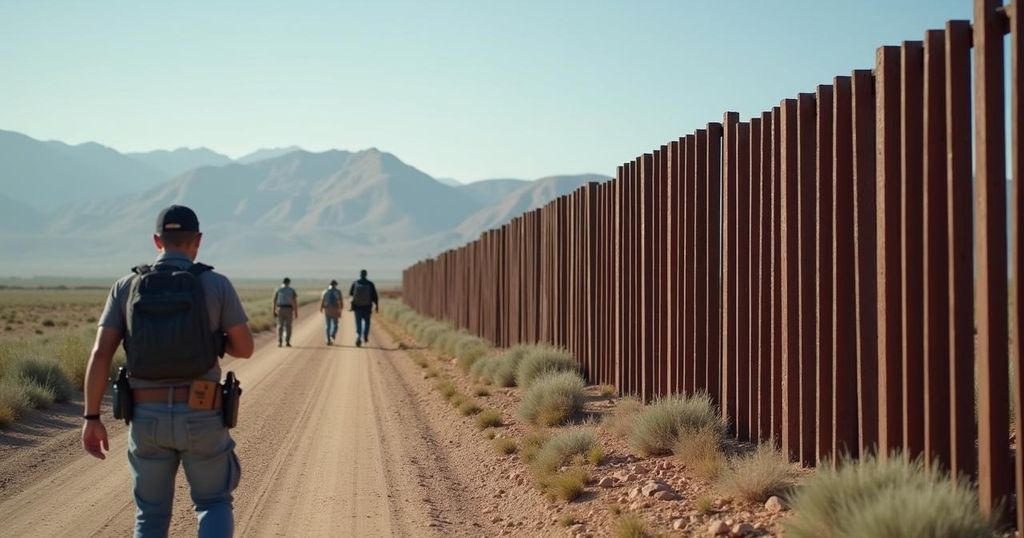Mexico’s Heightened Border Enforcement Ahead of U.S. Elections

As the U.S. election approaches, Mexico has intensified border enforcement, resulting in a dramatic decrease in migrant encounters at the U.S.-Mexico border. Analysts attribute this dynamic to an unwritten agreement with the Biden administration aimed at maintaining economic ties and stabilizing political tensions around immigration. While this enforcement reduces the immediate influx of migrants, it has also led to significant humanitarian challenges for those seeking to cross into the U.S.
As the U.S. presidential election approaches, Mexico has significantly intensified its enforcement of border controls, leading to a notable decrease in the number of migrants reaching the U.S.-Mexico border. Analysts attribute this shift to an unwritten agreement established between the governments of the U.S. and Mexico under the Biden administration. This agreement stems from Mexico’s keen interest in maintaining economic stability by ensuring that trade with the U.S. continues unimpeded, especially in light of the high political stakes associated with the impending U.S. elections. Illegal crossings have dominated Republican Donald Trump’s campaign, while immigration remains a critical vulnerability for Democrat Kamala Harris. The new Mexican President, Claudia Sheinbaum, is acutely aware of her country’s strategic role in affecting U.S. electoral dynamics, as expressed by former ambassador Arturo Sarukhán, who noted, “I am not arguing that they have explicitly decided to intervene or play a role in how Americans vote, but I think they are very aware of the role that Mexico plays in the context of the U.S. election.” Recent data reveal a dramatic fall in migrant encounters at the U.S. border, from nearly 250,000 encounters in December to fewer than 60,000 in the following month, marking the lowest monthly total since the Trump administration. This contrasts with a 160% surge in migrant encounters reported by Mexico’s immigration agency in the first seven months of 2023. Testimonies from individuals such as Mari Eduvid Sarmiento, a Venezuelan who attempted to migrate to the U.S. with her family, illustrate the difficulties migrants now face due to heightened enforcement measures. Previously, the Mexican government often permitted migrants to travel with relative ease; however, recent restrictions have left many stranded in major cities like Mexico City. Key negotiations between President Biden and Mexico’s leadership in late 2022 prompted an adjustment of enforcement strategies, which, while beneficial to border control, has created adverse circumstances for migrants amidst their perilous journeys through Mexico. This includes the imposition of visa requirements for certain nationalities and increased deportations, reshaping how Mexico handles migration. Critics argue that this approach has turned migration into a political tool, undermining Mexico’s responsibilities under international agreements.
In recent years, migration has become a central issue in U.S. politics, particularly within the context of presidential campaigns. As both parties grapple with the implications of immigration policies, the dynamics surrounding migrant encounters at the U.S.-Mexico border have shifted significantly. Under President Biden, a series of negotiations with Mexico has sought to address the surging numbers of migrants, leading to increased enforcement measures south of the border. These developments reflect not only domestic political pressures within the U.S. but also Mexico’s economic motivations in maintaining strong trade relations with its northern neighbor. Understanding the interplay of these factors is crucial to grasping the broader implications for international relations and humanitarian considerations concerning migration.
In summary, as the U.S. election draws near, Mexico’s heightened enforcement practices aim to manage migrant flows, directly impacting the political landscape in the United States. The informal agreement between the two nations has yielded a significant drop in migrant encounters, yet at a considerable cost to the human rights and safety of those seeking asylum. While this strategy may provide short-term political relief for the U.S. administration, the longer-term ramifications for migrants and Mexico’s position in future negotiations remain to be seen.
Original Source: www.usatoday.com







